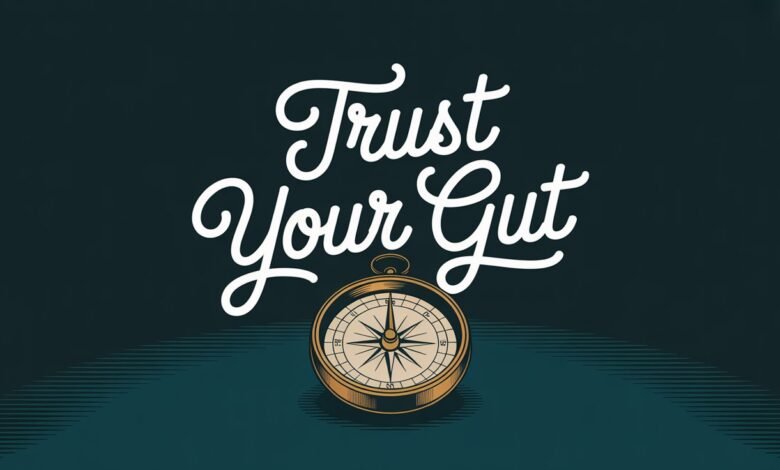Trust Your Gut – The Power of Listening to Your Intuition

Introduction to Trusting Your Gut
We’ve all had that moment — a quiet whisper in the back of our mind saying “don’t do it” or “this is the right move.” That’s what people mean when they say “trust your gut.” But in a world that values logic, data, and evidence, following an inner feeling can feel risky. Still, there’s something powerful about it.
What Does “Trust Your Gut” Really Mean?
When you trust your gut, you’re tapping into your intuition — a deep, instinctive knowing that doesn’t always rely on conscious reasoning. It’s the subtle, often immediate sense of what’s right or wrong for you.
Why People Ignore Their Intuition
Even when our gut speaks, we sometimes silence it. We might be afraid of making a mistake, or we may value logic over instinct. Society teaches us to “prove” everything, which can lead us to ignore gut feelings entirely.
The Science Behind Trusting Your Gut
How Your Brain and Body Work Together
Interestingly, “trust your gut” isn’t just a metaphor. The human gut has a network of neurons called the enteric nervous system, often called the “second brain.” It communicates with your brain through the vagus nerve, influencing emotions and decisions.
The Role of the Subconscious Mind
When you trust your gut, you’re drawing from stored knowledge and experiences. Your subconscious mind processes patterns faster than your conscious mind, delivering answers before you’ve had time to think logically.
Why Trusting Your Gut Matters in Daily Life
Decision-Making Made Simpler
Life is full of choices. While logic is essential, over-analyzing can slow you down. Trust your gut, and you might find decisions become easier, especially when facts are incomplete.
Reducing Overthinking and Stress
Gut decisions often bypass the exhausting loop of “what ifs.” When you trust your gut, you let go of the pressure to justify every move, which can bring peace of mind.
Situations Where You Should Trust Your Gut
Personal Relationships
Have you ever met someone and instantly felt at ease — or uneasy? That’s your gut talking. In relationships, trust your gut to guide you toward healthy connections and away from toxic ones.
Career and Business Choices
From choosing a job offer to launching a business, the right answer isn’t always on paper. Many successful entrepreneurs trust their gut when taking big risks.
Safety and Danger Signals
Your gut is a survival tool. If a place feels unsafe or a situation feels “off,” trust your gut — it may be alerting you to danger your mind hasn’t fully processed yet.
Balancing Intuition and Logic
When Gut Feelings Can Be Wrong
Trust your gut, but also remember it’s not foolproof. Biases, fears, and emotions can distort intuition. It’s best to check gut instincts against reality when possible.
Combining Data with Instinct
The smartest decisions often come from blending logic with intuition. Gather the facts, then trust your gut to interpret them in a way that aligns with your goals.
How to Strengthen Your Gut Instincts
Practicing Mindfulness
Mindfulness helps you tune into subtle body signals. A calm mind makes it easier to notice — and trust your gut — when it speaks up.
Learning from Past Experiences
Review times when you listened to your intuition and times you ignored it. Noticing patterns can boost your confidence to trust your gut in the future.
Paying Attention to Body Signals
Your body often reacts before your mind does — a racing heart, a sudden chill, or a warm, relaxed feeling. When these signs appear, pause and trust your gut.
Common Myths About Trusting Your Gut
“It’s Just a Guess” Myth
Some think gut feelings are random guesses. In reality, when you trust your gut, you’re using hidden knowledge gathered from years of experiences.
“Only Emotional People Trust Their Gut” Myth
Logic-driven people also rely on instinct — they may just call it “expert judgment.” Whether you’re a creative artist or an engineer, you can trust your gut effectively.

Real-Life Examples of Trusting Your Gut
Famous Entrepreneurs Who Listened to Their Intuition
Steve Jobs once said, “Have the courage to follow your heart and intuition.” Many innovators trust their gut when betting on bold ideas, even when others doubt them.
Everyday Stories of Life-Saving Gut Decisions
Countless people report moments when they trust their gut — stepping off a bus before an accident, avoiding a shady deal, or making a split-second choice that changes everything.
Conclusion
To trust your gut is to listen to a voice that blends instinct, experience, and subtle perception. While not a replacement for logic, it’s a vital decision-making tool. By learning when and how to trust your gut, you can make choices that feel authentic, confident, and aligned with who you are.
FAQs
- Is trusting your gut always right?
Not always — intuition can be wrong if influenced by fear or bias. Combine it with logic for the best results. - Can I train myself to trust my gut more?
Yes, through mindfulness, reflection, and practice, you can strengthen intuitive decision-making. - Why do I feel gut instincts physically?
The gut and brain are connected via the nervous system, causing physical sensations during instinctive reactions. - Should I trust my gut in business decisions?
Yes, but use it alongside research and analysis for balanced decisions. - What if my gut feeling conflicts with logic?
Weigh both. If facts say one thing but your gut says another, explore why before deciding.
Keep an eye for more news & updates on Evolant Agency!




